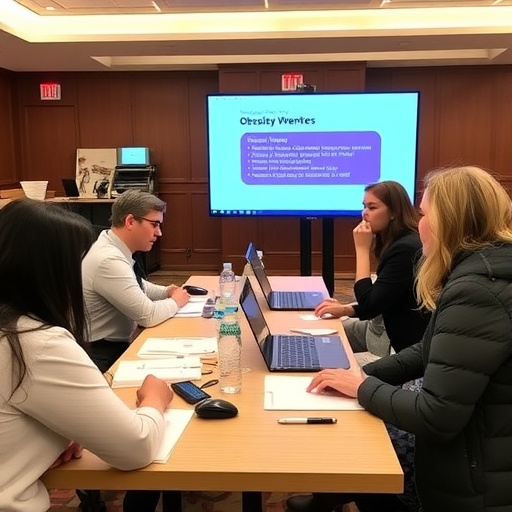Pennington Biomedical Research Center: Pioneering Obesity Science at ObesityWeek 2025
The imminent ObesityWeek 2025 conference, held from November 4th to 7th in Atlanta and hosted by The Obesity Society (TOS), stands as the foremost global congregation for obesity researchers and clinicians. This event is distinguished by its comprehensive coverage of evidence-based obesity science, presenting cutting-edge findings that span basic biology, clinical treatment, preventative measures, and innovative approaches in public policy. Pennington Biomedical Research Center, renowned for its nearly four decades of dedicated obesity research, will have a formidable presence at the conference, underscoring its enduring leadership in the domain.
Pennington Biomedical’s multidisciplinary faculty are not only participants but key contributors at ObesityWeek 2025. Their involvement includes spearheading over 250 expert-led courses, presentations, and panel discussions. The Center’s robust approach integrates lifestyle interventions, pharmacology, and surgical strategies, reflecting an unparalleled expertise that intersects various facets of obesity science. As articulated by Dr. John Kirwan, Executive Director of Pennington Biomedical, this scope equips the institution to meaningfully confront the obesity epidemic through both scientific innovation and clinical translation.
One of the hallmark areas of representation is the professional debate featuring Professor Emeritus Dr. Donna Ryan, where the contentious question of the clinical relevance addressed by The Lancet Commission on Obesity will be critically examined. Parallel discussions will engage in redefining metabolic health, with Dr. Eric Ravussin challenging prevailing paradigms concerning “Metabolically Healthy Obesity,” thereby fostering scientific discourse on whether this phenotype is a legitimate clinical entity or a misconception in medical literature.
The biological ramifications of weight loss will also be scrutinized, particularly in the session led by Dr. Steven Heymsfield, which probes the delicate balance between fat reduction and muscle preservation. This nuanced inquiry addresses the threshold at which muscle loss, often an unintended consequence of weight management, becomes detrimental to long-term health outcomes. Such investigations underscore the complexity of treating obesity beyond mere weight metrics, emphasizing metabolic health and muscle integrity.
In the arena of collaborative symposia, Dr. Timothy Allerton’s presentation at the TOS/Nutrition Obesity Research Centers Joint Symposium highlights the latest contributions from the INter-NORC Speaking Scholar Initiative (INSPIRE). This platform not only spotlights cutting-edge obesity research but also promotes inter-institutional knowledge exchange, propelling innovation in clinical and translational obesity science. Moreover, Dr. Leanne Redman, a prominent Pennington Biomedical investigator, chairs this session and extends her expertise to additional forums touching on gestational weight gain in underserved populations—an area of public health urgency given the implications for maternal and offspring metabolic health.
Dr. Redman’s collaborative work, alongside Drs. Emily Flanagan, Kaja Falkenhain, Robbie Beyl, Abby Altazan, Hannah Cabre, and John Apolzan, delves into nuanced interventions for gestational weight management, illustrating the center’s commitment to addressing health disparities across diverse demographic groups. This study exemplifies the intersection of clinical research and community health, revealing promising strategies to mitigate obesity-related risks in vulnerable populations.
Furthering the discourse on pediatric obesity, Dr. Amanda Staiano’s session on TEAM-UP—a large pragmatic trial examining family-based interventions for youth with obesity—sheds light on comparative effectiveness, providing granular insights into optimizing treatment modalities within family dynamics. These analyses are crucial for formulating policy and clinical guidelines that resonate with real-world applicability and efficacy.
Psychosensory factors influencing eating behavior are another focal point at ObesityWeek 2025, with Dr. Corby Martin addressing the cognitive and neurobiological underpinnings in the TOS/SSIB Joint Symposium themed “Turning Down the Volume of Food Noise.” This exploration into sensory cues and food-related environmental stimuli elaborates on their impact on dietary choices and obesity risk, contributing to the broader understanding of obesity’s behavioral dimensions.
The molecular biology of adipocytes and their role in lipid homeostasis will be articulated by David Mendoza in his presentation on the function of the KAT8 gene. This research, co-authored with Drs. Allison Richard and Jackie Stephens, provides transformative insights into adipocyte regulation, offering potential therapeutic targets for metabolic disorders linked to obesity. Such mechanistic investigations at the cellular level are vital for pioneering pharmacological interventions.
Pennington Biomedical’s commitment extends beyond presentations; faculty members such as Drs. Robert Dubin, Timothy Allerton, and John Apolzan will serve as session chairs, orchestrating scholarly dialogues critical to the scientific community’s progress. The Young Investigators Awards Competition, moderated by Dr. Jackie Stephens, fosters emerging talent, with promising researchers like Dr. Florina Corpodean showcasing novel findings that enrich the field.
The breadth of Pennington Biomedical’s contribution to ObesityWeek reflects its holistic research ecosystem, encompassing over 600 employees across 44 clinical and laboratory sites and supported by specialized core facilities. This infrastructure facilitates an integrated approach from bench to bedside and ultimately to public health policy, reinforcing the center’s global reputation as a nexus of innovation in obesity research.
ObesityWeek itself represents the epitome of multidisciplinary collaboration required to unravel obesity’s multifactorial etiology and to propel effective treatments. It seamlessly bridges foundational science with clinical application, encompassing diverse perspectives from metabolic biology, behavioral sciences, nutritional epidemiology, and health policy. Such synergy is indispensable for developing strategies that address obesity across the lifespan, from pediatric interventions to geriatric care, and across socio-economic spectra.
The Pennington Biomedical Research Center epitomizes scientific leadership dedicated to tackling obesity and related metabolic diseases. Its sustained advancements not only enhance mechanistic understanding but also translate into tangible interventions aimed at improving individual and population health outcomes. For those invested in the future of metabolic health, ObesityWeek 2025 promises to be a watershed event highlighting transformative research and comprehensive solutions to one of the most pressing health challenges of our time.
Subject of Research: Obesity, Metabolic Disorders, and Multidisciplinary Obesity Treatment and Prevention
Article Title: Pennington Biomedical Research Center Leading Innovations at ObesityWeek 2025
News Publication Date: Not specified
Web References: https://obesityweek.org/; http://www.pbrc.edu/
Image Credits: Ernie Ballard/PBRC
Keywords: Obesity, Diabetes, Metabolic disorders, Childhood obesity, Muscle diseases, Immune disorders, Infectious diseases, Scientific community, Scientific facilities, Research programs, Education, Academic publishing, Educational institutions, Basic research, Clinical research, Drug research, Research on children, Translational research




